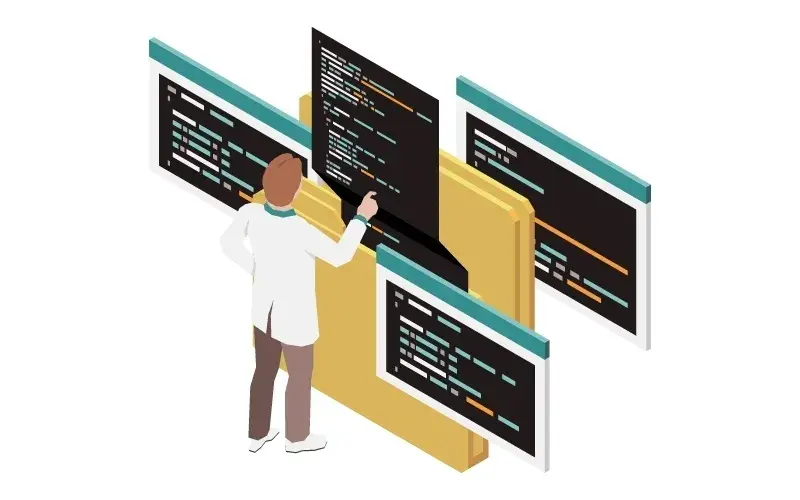Source code management tracks and manages changes to a software project’s source code. It allows developers to collaborate on projects, maintain version control, and revert to previous versions if necessary. By implementing a source code management system, developers can coordinate their efforts, keep track of changes made to the source code, and recover from mistakes or revert to a stable code version. There are two main source code management systems: centralized and distributed. Centralized systems use a central repository, while distributed systems allow each developer to have a complete copy of the project history on their local machine. Many different source code management tools are available, each with unique features and capabilities.
Benefits of Source Code Management
There are several benefits to implementing a source code management system in a software development project. Some of the key benefits include:
- Improved collaboration: A source code management system allows multiple developers to work on the same project simultaneously, making it easier to coordinate their efforts and merge changes.
- Enhanced version control: SCM systems keep track of every change made to the source code, allowing developers to easily see what changes have been made and who made them. This is especially useful when debugging or troubleshooting issues.
- Ability to revert to previous versions: SCM systems allow developers to revert to previous versions of the source code if necessary, making it easy to recover from mistakes or revert to a stable version.
- Enhanced security: SCM systems often include features such as version history and branching, which can help protect against accidental loss of code or data.
- Improved efficiency: By using a source code management system, developers can spend less time managing code and more time focusing on other essential tasks.
Overall, a source code management system can significantly improve a software development project’s efficiency, security, and collaboration.
 https://www.freepik.com/free-vector/code-folders-composition_23246900.htm
https://www.freepik.com/free-vector/code-folders-composition_23246900.htm
Types of Source Code Management Systems
There are two main source code management systems: centralized and distributed.
- Centralized systems, also known as version control systems (VCS), use a central server to store the project’s source code. Developers check out code from the central repository, make changes, and then check the code back in. Examples of centralized systems include Subversion and Perforce.
- Distributed systems, on the other hand, do not use a central repository. Instead, each developer has a complete copy of the project history on their local machine. This allows developers to work offline and commit changes to their local repository, which can then be pushed to a central repository or shared with other developers. Examples of distributed systems include Git and Mercurial.
When choosing a source code management system for a software development project, it’s important to consider the size and complexity of the project, the workflow of the project, and how the system integrates with other tools that may be used in the project.
Choosing the Right Source Code Management System
When choosing the right source code management system for a software development project, there are several factors to consider:
- Size and complexity of the project: A simple version control system (VCS) may be sufficient for small projects with a few developers. A distributed system may be more suitable for larger, more complex projects with many developers.
- Workflow: Different source code management systems support different workflows, so choosing a design that fits the project’s needs is essential. For example, some systems are better suited for linear workflows, while others are better for more flexible, branching workflows.
- Integration with other tools: Consider how the source code management system integrates with other tools that may be used in the project, such as issue-tracking systems or continuous integration platforms.
- Ease of use: Choose a system that is easy for the team to use, as this will help ensure that it is actually used properly.
- Cost: Consider the cost of the system, both upfront and ongoing, and any additional costs for training or support.
By considering these factors, you can choose a source code management system that is well-suited for the needs of your project and your team.
Common Source Code Management Tools
Many different source code management tools are available, each with unique features and capabilities. Some of the most common tools include:
- Git: Git is a popular distributed source code management system that is widely used in the software development industry. It is known for its fast performance, flexibility, and support for distributed workflows.
- Mercurial: Mercurial is another popular distributed system similar to Git in many ways. It is known for its simplicity and ease of use.
- Subversion: Subversion is a widely used centralized system known for its robustness and stability.
- Perforce: Perforce is a proprietary centralized system popular in large enterprises. It is known for its strong security features and support for large binary files.
- CVS: CVS (Concurrent Versions System) is an older centralized system that some organizations still use. It is known for its simplicity and broad platform support.
When choosing a source code management tool, it’s essential to consider the needs of your project and your team, the integration with other tools, and the tool’s cost.
If you need any more guidance to do a successful source code management, contact ustoday. We provide any kind of software solution which you need.
Feature image source: https://www.freepik.com/free-photo/_16444405.htm
